
Utopia, Limited; or, The Flowers of Progress, is a Savoy opera, with music by Arthur Sullivan and libretto by W. S. Gilbert. It was the second-to-last of Gilbert and Sullivan's fourteen collaborations, premiering on 7 October 1893 for a run of 245 performances. It did not achieve the success of most of their earlier productions.

His Majesty, or, The Court of Vingolia is an English comic opera in two acts with dialogue by F. C. Burnand, lyrics by R. C. Lehmann, additional lyrics by Adrian Ross and music by Alexander Mackenzie.
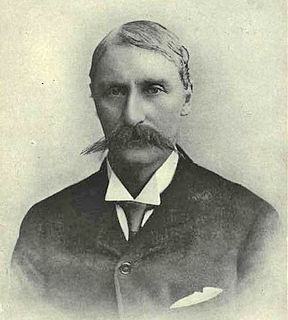
Alfred Cellier was an English composer, orchestrator and conductor.

The D'Oyly Carte Opera Company is a professional British light opera company that, from the 1870s until 1982, staged Gilbert and Sullivan's Savoy operas nearly year-round in the UK and sometimes toured in Europe, North America and elsewhere. The company was revived for short seasons and tours from 1988 to 2003, and with Scottish Opera it later co-produced two productions.

The Mountebanks is a comic opera in two acts with music by Alfred Cellier and Ivan Caryll and a libretto by W. S. Gilbert. The story concerns a magic potion that causes the person to whom it is administered to become what he or she has pretended to be. It is similar to several "magic lozenge" plots that Gilbert had proposed to the composer Arthur Sullivan, but that Sullivan had rejected, earlier in their careers. To set his libretto to music, Gilbert turned to Cellier, who had previously been a musical director for Gilbert and Sullivan and had since become a successful composer. During the composition of the piece Cellier died, and the score was finished by the original production's musical director, Ivan Caryll, who became a successful composer of Edwardian Musical Comedy.

After All! is a one-act comic opera with a libretto by Frank Desprez and music by Alfred Cellier. It was first performed at the Savoy Theatre under the management of Richard D'Oyly Carte, along with H.M.S. Pinafore and another short piece, Cups and Saucers, from December 1878 to February 1880.

François Arsène Cellier, often called Frank, was an English conductor and composer. He is known for his tenure as musical director and conductor of the D'Oyly Carte Opera Company during the original runs and early revivals of the Savoy operas.

Cups and Saucers is a one-act "satirical musical sketch" written and composed by George Grossmith. The piece pokes fun at the china collecting craze of the later Victorian era, which was part of the Aesthetic movement later satirised in Patience and The Colonel. The story of the sketch involves an engaged man and woman who each schemes to sell off the other's purportedly valuable china.
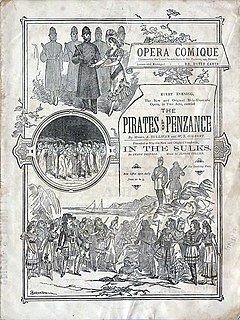
In the Sulks is a one-act comic opera with a libretto by Frank Desprez and music by Alfred Cellier. It was first performed at the Opera Comique on 21 February 1880; revived 3 April 1880 to 2 April 1881 as a curtain raiser to The Pirates of Penzance, and again from 25 April to 2 May 1881 and from 11 to 14 October 1881 as a curtain raiser to Patience. It was also performed from 21 February to 20 March 1880 at matinees with the Children's Pinafore. The piece also toured frequently from 1879 to 1882.
Uncle Samuel is a one-act comic opera with a libretto by Arthur Law and music by George Grossmith. It was first produced at the Opera Comique on 3 May 1881 to 8 October 1881, as companion piece to Patience. The piece also toured from December 1887 to June 1888 as a companion piece to H.M.S. Pinafore.

Mock Turtles is a one-act comic opera with a libretto by Frank Desprez and music by Eaton Faning. It was first produced at the Savoy Theatre on 11 October 1881 as a curtain raiser to Patience, then from 26 November 1882 to 30 March 1883 with Iolanthe. The piece also toured from December 1881 throughout 1882. It also toured in 1883 and 1884 and enjoyed further revivals, including a tour in 1897 with J. M. Gordon and his company.

A Private Wire is a one-act musical "vaudeville" operetta with a libretto by Frank Desprez and Arnold Felix and music by Percy Reeve. It was first produced at the Savoy Theatre on 31 March 1883 to 1 January 1884 as a companion piece to Gilbert and Sullivan's Iolanthe. The piece also toured from March to July 1884.
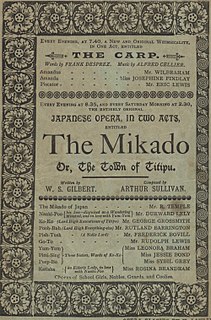
The Carp is a one-act comic opera with a libretto by Frank Desprez and music by Alfred Cellier. It was first produced at the Savoy Theatre from 13 February 1886 to 19 January 1887, as a companion piece to The Mikado. It was then revived as companion to Ruddigore from 21 February 1887 to 5 November 1887. The piece also toured throughout 1888.

Mrs. Jarramie's Genie is a one-act comic opera with a libretto by Frank Desprez and music by Alfred Cellier and François Cellier. The piece was first presented at the Savoy Theatre on 14 February 1888, as a curtain raiser to the revival of H.M.S. Pinafore. It was subsequently presented as a curtain raiser to revivals of The Pirates of Penzance and The Mikado, and then with The Yeomen of the Guard.
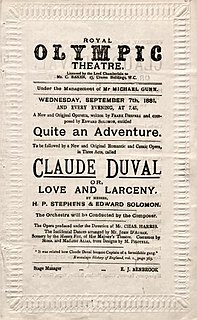
Quite an Adventure is a one-act comic opera by Edward Solomon with a libretto by Frank Desprez. The farcical plot concerns a house-guest who mistakes his hostess's husband for an intruder.
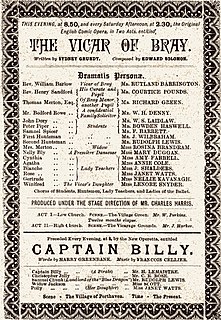
Captain Billy is a one-act comic opera with a libretto by Harry Greenbank and music by François Cellier. It was first performed at the Savoy Theatre on 24 September 1891 until 16 January 1892, as a curtain raiser to The Nautch Girl, and from 1 February 1892 to 18 June 1892, as a curtain raiser to The Vicar of Bray, for a total of 217 performances.

Emily Owen was an English opera singer and actress, best known for her performances in soprano roles of the Savoy Operas with the D'Oyly Carte Opera Company. Beginning as a child actress, she performed for two decades before falling ill on tour and dying at age 33.
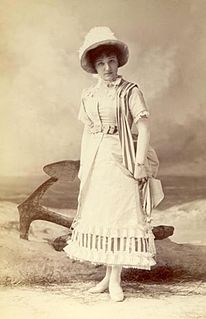
Alice Julia Burville was an English soprano and actress, best known for her performances in Gilbert and Sullivan operas and other operettas in the 1870s and 1880s.
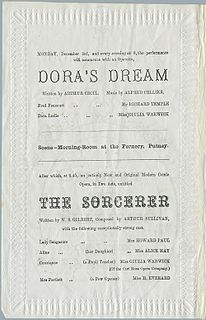
Dora's Dream is a one-act operetta, with music composed by Alfred Cellier and a libretto by Arthur Cecil.

John Jones Hewson, credited as Jones Hewson, was a Welsh singer and actor known for his creation and portrayal of baritone roles with the D'Oyly Carte Opera Company from 1896 to 1901.


















